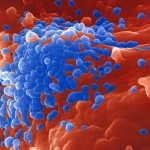Link to Pubmed [PMID] – 23977391
PLoS ONE 2013;8(8):e73641
Human APOBEC3 enzymes deaminate single stranded DNA. At least five can deaminate mitochondrial DNA in the cytoplasm, while three can deaminate viral DNA in the nucleus. However, only one, APOBEC3A, can hypermutate genomic DNA. We analysed the distribution and function of the two APOBEC3A isoforms p1 and p2 in transfected cell lines. Both can translocate to the nucleus and hypermutate CMYC DNA and induce DNA double strand breaks as visualized by the detection of ©H2AX or Chk2. APOBEC3A induced G1 phase cell cycle arrest and triggered several members of the intrinsic apoptosis pathway. Activation of purified human CD4+ T lymphocytes with PHA, IL2 and interferon α resulted in C->T hypermutation of genomic DNA and double stranded breaks suggesting a role for APOBEC3A in pro-inflammatory conditions. As chronic inflammation underlies many diseases including numerous cancers, it is possible that APOBEC3A induction may generate many of the lesions typical of a cancer genome.
